Jill Christianson, UNA-NCA Board Chair, opened the program with the statement that this meeting would be a “reflection on where we have been and where we are going.” This assertion perfectly encapsulates what this evening was about. In the following two hours, various speakers would highlight the incredible achievements from 2022 and 2023, but also explain what the United Nations Association of the National Capital Area will do in the next year.
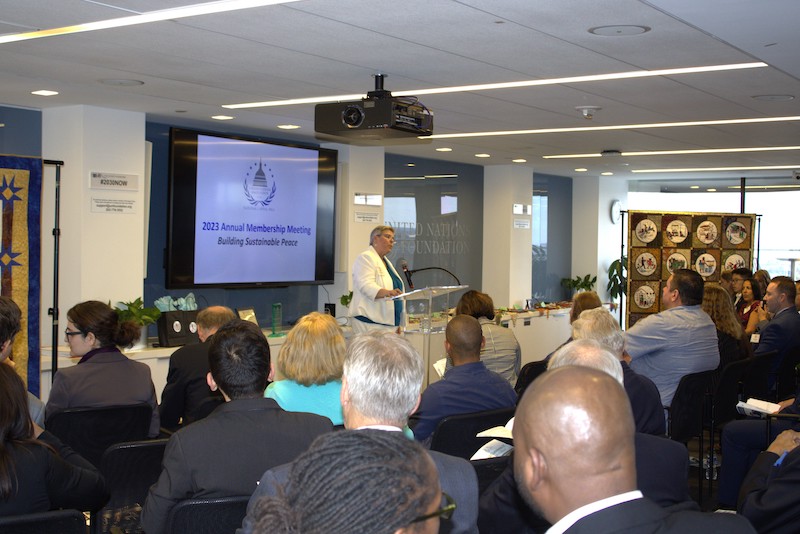 First, Ms. Christianson remembered Ambassador Steven McGann, a former United States ambassador and UNA-NCA board member. He was also involved with the Black Professionals in International Affairs and Claremont McKenna. Ms. Christianson emphasized the “void” that has been left by his passing, but also the importance of the new members that Ambassador McGann brought into the United Nations Association.
First, Ms. Christianson remembered Ambassador Steven McGann, a former United States ambassador and UNA-NCA board member. He was also involved with the Black Professionals in International Affairs and Claremont McKenna. Ms. Christianson emphasized the “void” that has been left by his passing, but also the importance of the new members that Ambassador McGann brought into the United Nations Association. Then, Stephen Moseley, the previous Board Chair, presented the Arthur W. Johnson Leadership Award, dedicated to a former long-term board and advisory council member. This award was presented to Lise Grande. Lise Grande has been around the world serving the United Nations as a humanitarian specialist, is now the President of the United States Institute for Peace, and has been involved in Haiti, Angola, and other conflicts where she has learned to negotiate with both state and non-state actors. She gave an informative speech about the changing nature of conflict mediation where she listed three primary reasons that the UN’s approach to peace negotiation
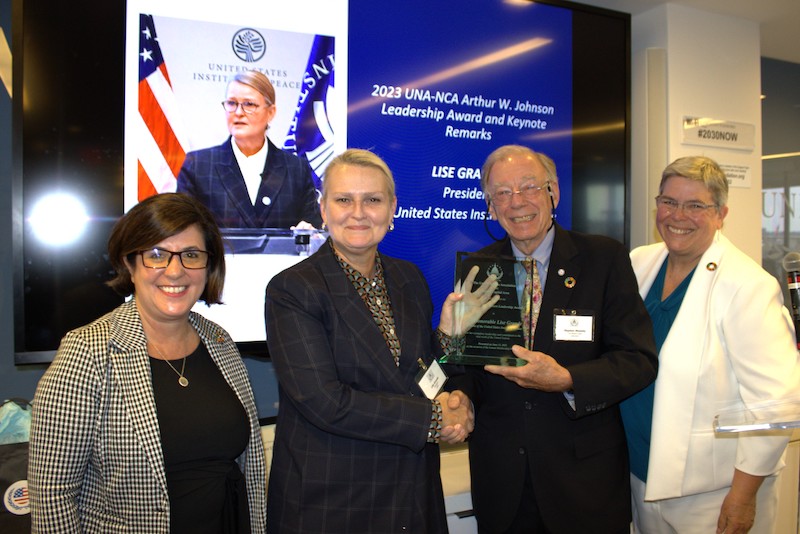 needs to change. First, the changing global balance of power has impacted our previously dependable structures and transparent practice that have made the UN successful in the past. Second, the proliferation of non-state actors around the world has made it more difficult to negotiate, especially between so many different belligerents. And thirdly, warfare is evolving to include remote technology and cyber warfare. She then provided five things that the UN can do to meet these challenges:
needs to change. First, the changing global balance of power has impacted our previously dependable structures and transparent practice that have made the UN successful in the past. Second, the proliferation of non-state actors around the world has made it more difficult to negotiate, especially between so many different belligerents. And thirdly, warfare is evolving to include remote technology and cyber warfare. She then provided five things that the UN can do to meet these challenges:- Double down on international law: protecting civilians is of the utmost importance;
- Invest in diplomats from diverse backgrounds; the elite diplomats of the past will no longer be sufficient;
- Increase the global commitment to international treaties on new technology;
- Improve non-lethal forms of persuasion such as targeted sanctions to put pressure or economic incentives;
- Invoke Chapter 8 to allow regional bodies to engage in areas outside of state control.
Along with Ms. Christianson, Paula Boland, UNA-NCA President, then presented the UNA-NCA Annual Report. She first re-emphasized the theme of this year, “Building Sustainable Peace,” and the mission of the organization: educating and mobilizing Americans for a strong UN-US partnership. Emphasizing the role of the Sustainable Development Goals in each goal, Ms. Boland then outlined four goals from the past year and explained our successes in each category:
- Build support for the work of the UN;
- Enhance membership and intersectional agreement;
- Build comprehensive partnership;
- Institutionalize and systematize processes to maintain an integrated and financially stable organization.
She then highlighted some specific work from the previous year. Ms. Boland listed the State Department Model UN Conference, Graduate Fellows Program’s professional development elements, and of course, UNA-NCA’s role in passing the Elimination of Discrimination Against Women Amendment Act of 2022 (EDAW), based on the UN’s treaty of a similar name that the United States has not ratified.
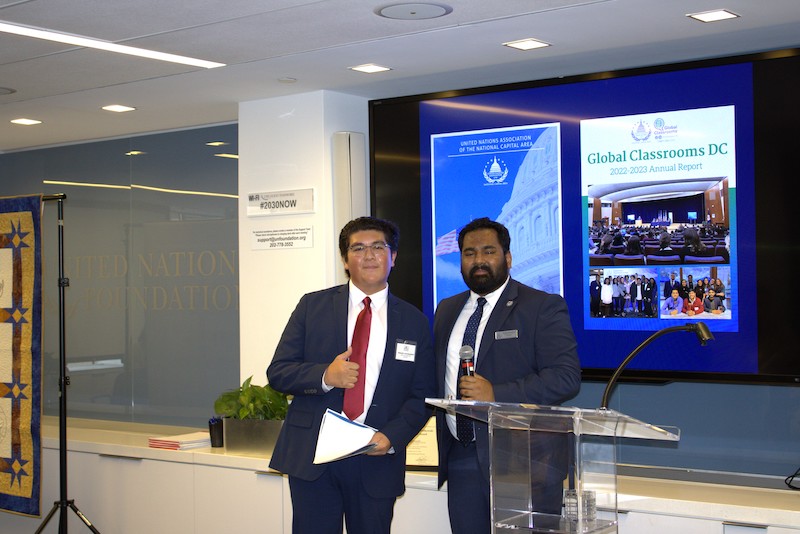 Next, Sarmat Chowdhury began to speak about the Global Classrooms DC (GCDC) program’s success from last year. As a year of “normalization and expansion,” the GCDC program expanded to 46 schools, over 1,200 students, and 100 educators. Furthermore, the program increased its Title I school retention rate (schools that require more federal funding). This success is especially meaningful to Mr. Chowdbury because he started this work when he realized not everyone had the opportunity to attend Model UN conferences like him. A former GCDC student, Sebastian Sanchez-Clavel, then gave a speech about the importance of GCDC in how it is “like a gardener to a garden” in how it “ensures space for the seeds of learning to grow” and “showers” students with opportunities for those seeds to grow. He explained that many students get into politics and international relations through GCDC.
Next, Sarmat Chowdhury began to speak about the Global Classrooms DC (GCDC) program’s success from last year. As a year of “normalization and expansion,” the GCDC program expanded to 46 schools, over 1,200 students, and 100 educators. Furthermore, the program increased its Title I school retention rate (schools that require more federal funding). This success is especially meaningful to Mr. Chowdbury because he started this work when he realized not everyone had the opportunity to attend Model UN conferences like him. A former GCDC student, Sebastian Sanchez-Clavel, then gave a speech about the importance of GCDC in how it is “like a gardener to a garden” in how it “ensures space for the seeds of learning to grow” and “showers” students with opportunities for those seeds to grow. He explained that many students get into politics and international relations through GCDC. 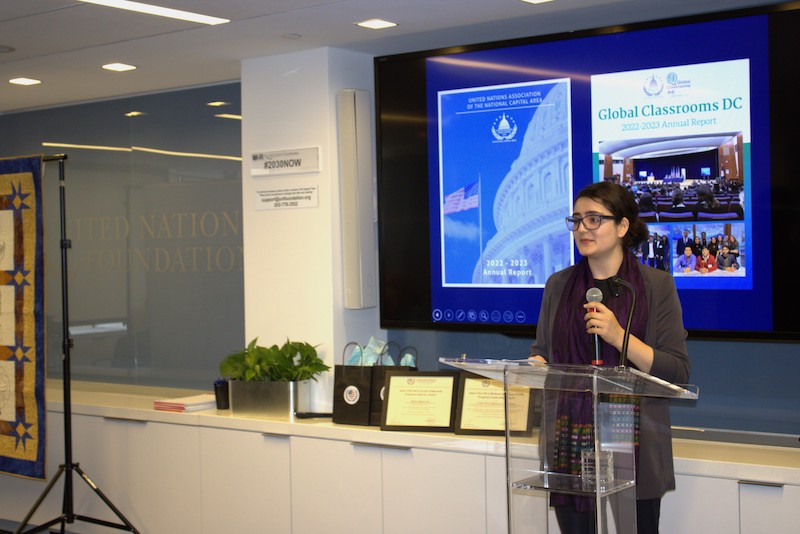 After Mr. Chowdhury recognized his interns, Maryam Rayed gave an emotional speech. A Fulbright Scholar who came to the United States right after the government in her home country, Afghanistan, collapsed, she exposed herself to real-world challenges and the impact to her personally through the Graduate Fellows Program. She is a women empowerment advocate who wanted to receive her Master's Degree and then return to Afghanistan and help rebuild her country - she has not returned in two years. Furthermore, she appreciated how the program brought to light pressing issues through a UN lens, offered career development and was a diverse and inclusive program where she met people of all backgrounds. Ms. Rayed concluded by saying that she believes “it is possible to bring a change” and we should “be part of that change.”
After Mr. Chowdhury recognized his interns, Maryam Rayed gave an emotional speech. A Fulbright Scholar who came to the United States right after the government in her home country, Afghanistan, collapsed, she exposed herself to real-world challenges and the impact to her personally through the Graduate Fellows Program. She is a women empowerment advocate who wanted to receive her Master's Degree and then return to Afghanistan and help rebuild her country - she has not returned in two years. Furthermore, she appreciated how the program brought to light pressing issues through a UN lens, offered career development and was a diverse and inclusive program where she met people of all backgrounds. Ms. Rayed concluded by saying that she believes “it is possible to bring a change” and we should “be part of that change.” 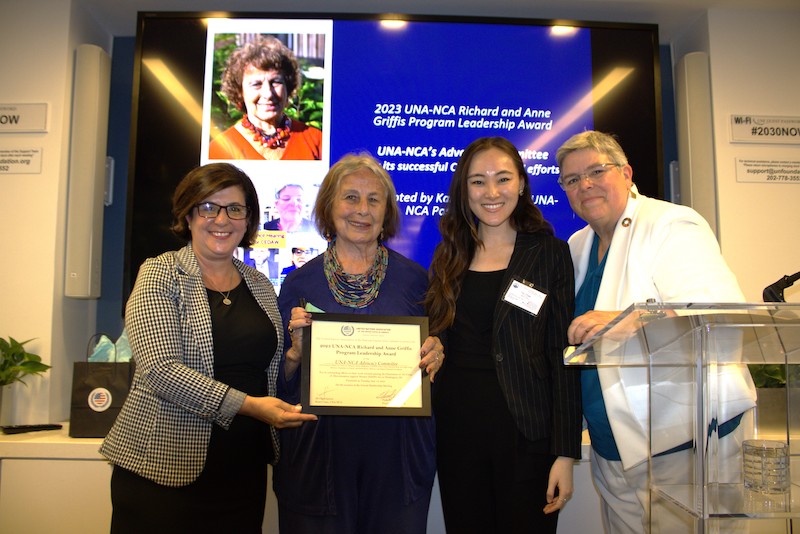 Following a brief violin performance by Diana Omer, the Richard and Anne Griffis Program Leadership Award was then presented by the legislative assistant to DC City Council Member Robert C. White Jr., Lisa T. Wright. Because Ms. Wright and Council Member White were involved in passing EDAW, they presented the award to the Advocacy Committee with special recognition to Karen Mulhauser, a past board chair of our chapter. Ms. Mulhauser was heavily involved in the campaign to make this bill into law, even testifying at public hearings.CEDAW ensures that women can contribute to any government agency, providing gender analyses of DC government agencies, training on equity and human rights to government employees, and a commitment to leading the nation on gender equality. Ms. Mulhauser then explained the long road to reach this point. She explained that in 2015 she was embarrassed that the United States had not signed on to the international agreement, CEDAW, and although a few city council members said they would introduce a bill, it never even received a hearing. Now, due to the work of Council Member White, the bill is law. Finally, she concluded that she was pleased to see more young people than old people in the crowd.
Following a brief violin performance by Diana Omer, the Richard and Anne Griffis Program Leadership Award was then presented by the legislative assistant to DC City Council Member Robert C. White Jr., Lisa T. Wright. Because Ms. Wright and Council Member White were involved in passing EDAW, they presented the award to the Advocacy Committee with special recognition to Karen Mulhauser, a past board chair of our chapter. Ms. Mulhauser was heavily involved in the campaign to make this bill into law, even testifying at public hearings.CEDAW ensures that women can contribute to any government agency, providing gender analyses of DC government agencies, training on equity and human rights to government employees, and a commitment to leading the nation on gender equality. Ms. Mulhauser then explained the long road to reach this point. She explained that in 2015 she was embarrassed that the United States had not signed on to the international agreement, CEDAW, and although a few city council members said they would introduce a bill, it never even received a hearing. Now, due to the work of Council Member White, the bill is law. Finally, she concluded that she was pleased to see more young people than old people in the crowd. After announcing the results of the board election, the program then turned to its final award: the 2023 UNA-NCA Evelyn Falkowski Award, named for the first Executive Director of UNA-NCA. This volunteer service award was presented by UNA-NCA’s previous Vice Chair of Strategy & Operations, Lauren Terrel, who explained that Ms. Falkowski mobilized friends and colleagues to fight for civil rights and equal opportunity employment. This award was given to Abbey Ogunwale. Mr. Ogunwale is
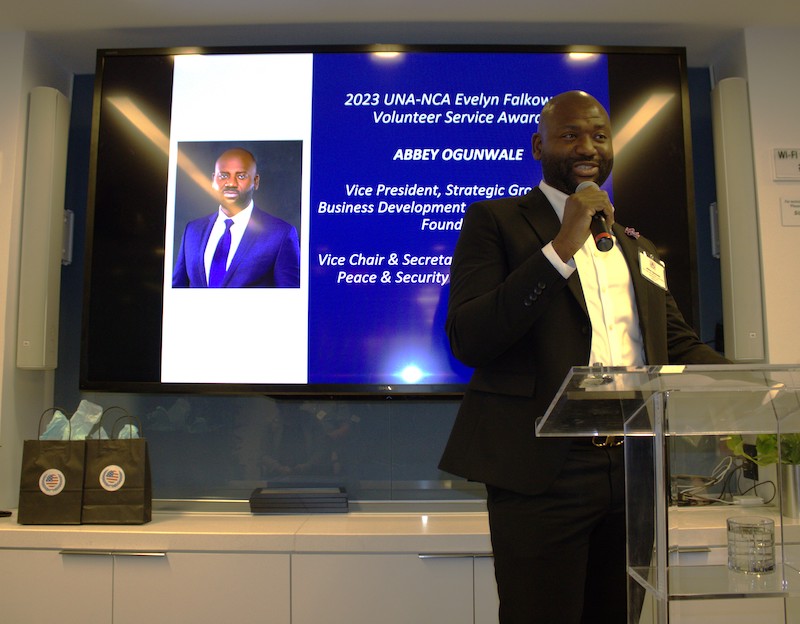 the Co-Chair of the Peace and Security Committee, UNA-NCA Vice Chair & Secretary, and a “seasoned” leader in international development. He is admired for his quiet strength: when he speaks people listen because he always has something insightful or meaningful to add to a discussion. Mr. Ogunwale explained how he is grateful to UNA-NCA for the network it has provided him and the training that it has and continues to bestow on him.
the Co-Chair of the Peace and Security Committee, UNA-NCA Vice Chair & Secretary, and a “seasoned” leader in international development. He is admired for his quiet strength: when he speaks people listen because he always has something insightful or meaningful to add to a discussion. Mr. Ogunwale explained how he is grateful to UNA-NCA for the network it has provided him and the training that it has and continues to bestow on him. Ms. Christianson then concluded by saying that it is upon all of us to be involved. After a concluding musical performance by Ms. Omer, the conference broke for a reception.








